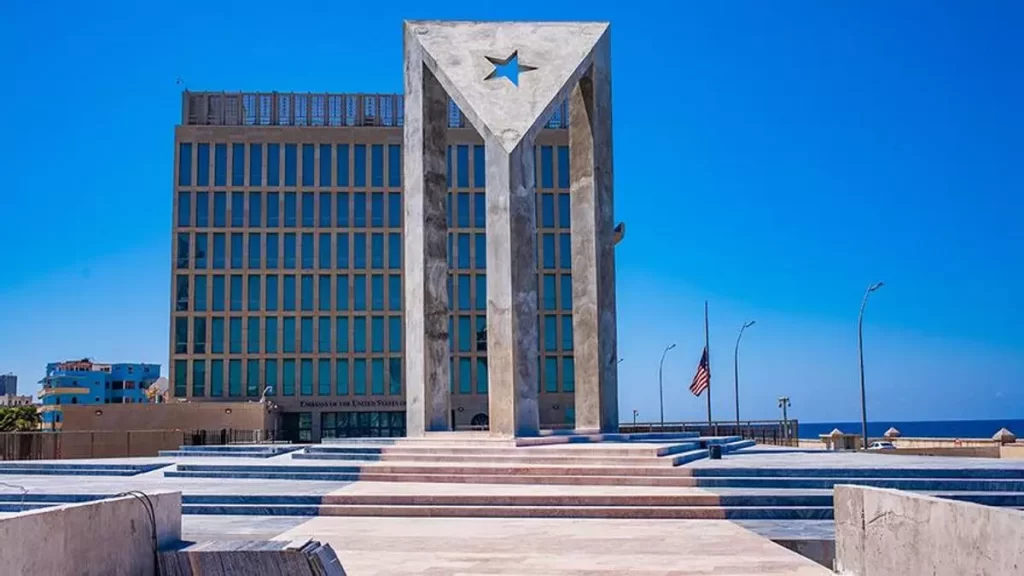The main event of the International Workers’ Day will not be held at the Plaza de la Revolución to save on fuel

![]() 14ymedio, Madrid, 15 April 2024 — The celebration of May 1, international workers’ day, once again dispenses with what was its usual venue for decades and moves to the Anti-imperialist Platform in Havana. The news was given by Ulises Guilarte de Nacimiento, general secretary of the Cuban Workers’ Union (CTC) this Sunday, who pointed out fuel savings as the reason for moving the event.
14ymedio, Madrid, 15 April 2024 — The celebration of May 1, international workers’ day, once again dispenses with what was its usual venue for decades and moves to the Anti-imperialist Platform in Havana. The news was given by Ulises Guilarte de Nacimiento, general secretary of the Cuban Workers’ Union (CTC) this Sunday, who pointed out fuel savings as the reason for moving the event.
He indicated that, “There, we will ratify that the Cuban working class will continue to pay particular attention to everything related to the recovery of the economy, efficiently taking advantage of the resources we have to increase the supply of goods and services, as a way to rescue the purchasing power of salaries and pensions.”
The leader of the CTC, also a member of the political bureau of the Communist Party, explained that the intention this year is to celebrate the date “with gatherings in squares, towns and work centers that do not require massive use of transportation”. For this central event in Havana, the authorities are counting on the assistance of 200,000 workers and their families, residents of the municipalities of Plaza, Old Havana, Centro Habana, Cerro and the closest areas of Playa.
The CTC leader explained that the intention this year is to celebrate the date “with gatherings in squares, towns and work centers that do not require massive use of transportation.”
“This is another scenario in which we have demonstrated the spirit of unity, rebellion and struggle of the Cuban Revolution,” he stressed in relation to the location of an event which, in most countries of the world, serves for workers to demand from Governments the labor rights that they do not yet enjoy.
This is the second consecutive year in which the authorities renounce the traditional celebration at the Plaza de la Revolución for economic reasons, after last year’s event transformed into a march along the Malecón and small events in other municipalities and cities. On that occasion, Guilarte de Nacimiento attributed it to “the complex economic situation (…) and, in particular, the limitations of fuel assurance.”
A year ago, the leader called to “reformulate the celebration, maintaining its commemoration, but in conditions of rationality and maximum austerity”, but it is not the only problem that is resolved with these changes. The Anti-imperialist Plaform’s size is just over 13,000 square meters, compared to the 72,000 square meters of the Plaza de la Revolución, one of the largest in the world. Reducing the stage to a fifth of its former size makes it possible to overshadow the lackluster nature of an event in which there are fewer and fewer attendees, despite that the vast majority have been transported to the capital.
In 2016, about 600,000 people attended the event, according to official data, of which 200,000 (the same total number expected for 2024) were self-employed. Even in 2018 there were about 800,000 participants.
But just a year later, the event had visibly deflated and the cancellation of bus routes used to carry the marchers did not go down well with the population. On that occasion, to make matters worse, there was not even a speech: Díaz-Canel, already President, did not speak; nor Raúl Castro, dressed in a military uniform and saluting; nor even Guilarte de Nacimiento, head of the only union allowed in the country. The only thing that was heard was a speech by the deceased Fidel Castro played through a loudspeaker.
The arrival of the pandemic forced the day’s celebration to be suspended in 2020 and 2021, until its return in 2022, when an attempt was made to recover its lost brilliance without achieving much, despite having mobilized all the buses, which Cubans had not seen in months.
For this year’s event, Guilarte de Nacimiento foresees “a moment of reaffirmation of the unrestricted support of the vast majority of the people for their social project”
For this year’s event, Guilarte de Nacimiento foresees “a moment of reaffirmation of the unrestricted support of the vast majority of the people for their social project.” In addition, he wants it to be used to “denounce the criminal nature of the [US] blockade*, the main obstacle to Cuba’s economic and social development.”
The Anti-Imperialist Platform, where an event in support of Palestine was also recently held, is about to wrap up remodeling works that have been dragging since 2019. The renovations have undergone a myriad of calamities, among them, a shortage of cement. Last week, TV’s Canal Caribe dedicated a brief report explaining that the project is in its final phase, after native plants have been added and having completed the last modifications, though the exact day of the project’s completion is not known.
*Translator’s note: There is, in fact, no US ‘blockade’ on Cuba, but this continues to be the term the Cuban government prefers to apply to the US embargo. Originally imposed in 1962, the embargo, although modified from time to time, is still in force.
Translated by Norma Whiting
____________
COLLABORATE WITH OUR WORK: The 14ymedio team is committed to practicing serious journalism that reflects Cuba’s reality in all its depth. Thank you for joining us on this long journey. We invite you to continue supporting us by becoming a member of 14ymedio now. Together we can continue transforming journalism in Cuba.
